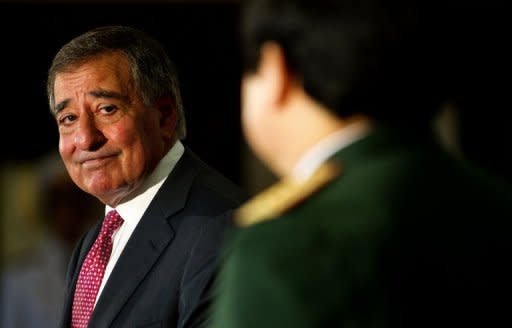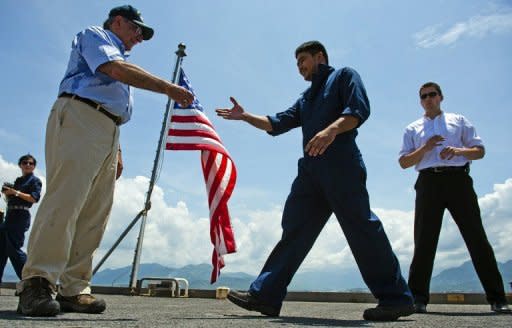Vietnam grants access to new areas for MIA search
Vietnam said Monday it would open up new areas to American teams searching for missing war-time soldiers, the latest sign of closer ties between two countries that are wary of China's growing power. Vietnamese Defence Minister Phung Quang Thanh announced the move after talks with his US counterpart Leon Panetta, whose two-day visit has underscored Washington's determination to shore up its influence in the face of a more assertive China. Panetta said the United States had an "enduring commitment" to build a strong defence partnership with its former foes in Vietnam. "We have taken some very important steps in advancing that relationship in our meeting," he said at a joint news conference. Panetta and Thanh also exchanged artefacts -- a Vietnamese soldier's frayed diary and a collection of long lost personal letters written by a US Army sergeant -- that were found by troops decades ago during the Vietnam War. The Pentagon chief, who later met Prime Minister Nguyen Tan Dung, thanked the Vietnamese side "for their longstanding assistance in efforts to identify and locate the remains of our fallen service members and those missing in action in Vietnam". The three new excavation areas include two aircraft crash sites in central Vietnam and an area where a US soldier went missing in Kon Tum province bordering Cambodia and Laos. For more than two decades, Hanoi and Washington have cooperated on the recovery of American servicemen listed as missing in the conflict, which ended in 1975 with Vietnam's reunification. With witnesses ageing and acidic soil eating into the buried remains, the search teams are racing to find the bodies of more than 1,200 US soldiers still missing. Investigators told Panetta Monday that they may have as little as five to seven years before all evidence is lost. US officials said the exchange of artefacts by the two defence chiefs was the first of its kind, and served to symbolise a healing of wounds. The papers handed over by the Vietnamese included correspondence from Sergeant Steve Flaherty, whose letters home were used as fodder for propaganda broadcasts. In his letters home, Flaherty, who was killed in 1969, described harrowing battles and heavy casualties. "This is a dirty and cruel war but I'm sure people will understand the purpose of this war even though many of us might not agree," he wrote. The Americans handed over a small maroon diary belonging to Vu Dinh Doan, a Vietnamese soldier found dead in a machine gun nest near Quang Ngai. Before his talks with his Vietnamese counterpart, Panetta on Sunday became the first Pentagon chief since the end of the conflict to visit southern Cam Ranh Bay -- a major American base during the Vietnam War. He said the port could play a pivotal role in the American military's shift towards the Pacific. Panetta, who announced new plans Saturday to relocate the majority of the US naval fleet to the Pacific by 2020, said he saw "tremendous potential" for US naval ship access at Cam Ranh. The United States does not sell lethal weapons to Vietnam due to human rights concerns, but defence minister Thanh said his country was keen to purchase American arms and hoped that Washington would lift the restrictions. The Pentagon's plan to send more warships to the Pacific reflects US concern over China's rising economic and military might, particularly in the South China Sea. But Panetta, on a nine-day tour of Asia, has insisted the strategy is not a challenge to Beijing. "Our goal is to work with all nations in this region, including China," he said. Thanh denied any friction with Beijing, saying China was "a comprehensive and strategic partner of Vietnam". Beijing and Hanoi have rival claims to islands in the South China Sea, which are believed to have huge oil and gas reserves, and US officials privately acknowledge that China's assertive stance has brought Vietnam and Washington closer together.




